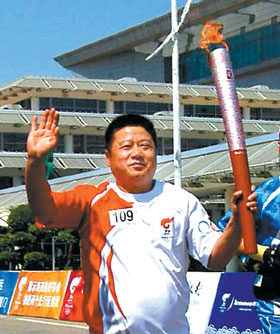XIAMEN - As an eight-time world champion and former ambassador for Sino-Japanese "ping-pong diplomacy" in the late 1970s and early '80s, Guo Yuehua is used to being greeted by cheering crowds.

Guo Yuehua
|
But even this national hero was surprised at the roaring welcome he received yesterday from the people of his hometown of Xiamen as he ran the first leg of the Olympic torch relay.
"It didn't feel like it was Xiamen. People here are usually very cool; they're so devoted to a comfortable life that they've never been too enthusiastic about anything before," he told China Daily.
"I was relaxed when I ran and waved to the crowds. I felt like the relaxed feeling came from the goodness of the torch relay.
"It's not like during the actual Games, when spectators support and cheer only for their own side," he said.
Guo, who is the chief coach of the Fujian Table Tennis Team, said his fondest memory is of his trip to Japan 36 years ago. He was just 16 and a student at the Fujian Sports School when he made his first overseas visit as a member of the Chinese Youth and Teenagers Table Tennis Delegation.
The 16-member group was sent to Japan immediately after Tanaka Kakuei, its then prime minister, made his ice-breaking visit to China in September 1972, at the invitation of the then Chinese Premier Zhou Enlai.
The group was headed by table tennis star Zhuang Zedong, who a year earlier had led a similar delegation to the United States to take part in the so-called Sino-US "ping-pong diplomacy".
"It wasn't just about beating the Japanese boys," Guo said.
"At that time, people rarely got the chance to go abroad, so the friendships we made with the Japanese were really genuine. I can still remember the girls hugging each other and crying when we had to say goodbye."
Nevertheless, Guo demonstrated his talent on tour, and on his return was recruited by the national youth team. In 1977, he joined the senior team and later that year won his first world title.
He went on to win seven more world titles before he retired in 1983.
Unfortunately, he never got the chance to compete in the Olympics, as table tennis was introduced to the Games only in 1988, five years after he retired from the sport.
"I chose to retire because I wasn't feeling at my best, and I was confident that the young players coming through were good enough to maintain the status of the Chinese team," he said.
In his heyday as a sports star, Guo said he received dozens of letters every day from fans across the country.
For the first year after retiring, Guo worked as a sports official in Fuzhou. He then studied for two years at a local university and in 1987, moved to Germany, where he played competitive table tennis for the next six years.
"It was a different world and the reality was harsh. Life was good if you won, but not so good when you lost," he said.
On his return to China he lived in Hong Kong, and two years ago moved to Fujian, where he now lives and works as a coach to the province's top young players.
"It's a big problem that most coaches focus only on established players with the potential to win titles in the short term," he said.
"I like to work with the younger ones. Their future achievements might not be down to me, but I am sure several of them will go on to be very successful."